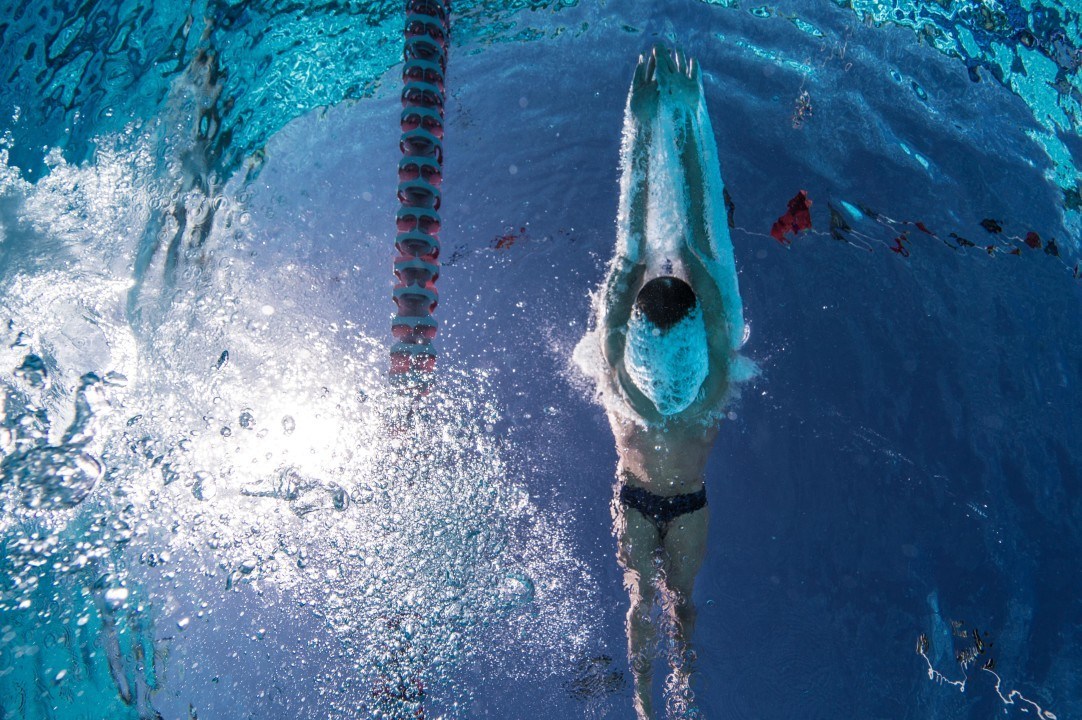Katie Kaestner, Kenyon College ’16 political science major, biology minor. Currently working as a medical scribe with plans to pursue Master of Science in Physician Assistant Studies and Master of Public Health degrees. I swam competitively for 12 years and am now continuing to enjoy the sport with my local Masters swim team.

For many, this past week has marked the beginning of a new academic year and new season for collegiate athletes across the nation. As a recent graduate, I yearn to feel again the flutter in my chest as I snuggle down for the last night in my childhood bed and imagine all the wonderful things to come, and hear that renaissance of campus life erupting with chatter and squeals of reunion. In all the excitement at this time of year, however, there was always a storm of fear brewing in the far reaches of my mind, and a voice that whispered, “Don’t mess it up this year” – though that’s the radio-edit version of it.
It’s impossible to pinpoint when this fear exactly began, but I can guess. I have kept journals since the 7th grade, to remember all my memories, wishes, hopes and dreams, but for October 27th, 2012, I apparently chose to remember numbers – calorie counts of each meal, weight at different times of day, training splits, and race splits of the meet I swam the day before. This was the first time I had ever logged numbers in my journal, and it would not be the last. I look back through the entries and can clearly see a progression from literary, poetic entries to that of an Excel spreadsheet. Immaterial statistics began to infiltrate and tarnish memories of what should have been the most exciting and propitious time of my life – college. Don’t get me wrong; I could not have asked for a better environment and community for my college experience. Some of my fondest memories in life will forever be the laughs and love I shared with my teammates, classmates, professors, and coaches, and I saw in myself enormous personal growth over the four years. The self-destructive mentality has been a long-time coming, and I only wish I had recognized the warning signs.
Freshman year is always one dictated by adjustment, trial and error, and the inevitable unknown. I was raised an only child, and as an athlete I blindly followed my coach’s every word who never even told me what “taper” was (you mean those practices were hard and the others were easy for a reason?), college was the first time I had all this independence and control over my daily activity. My word decided my diet, my sleeping habits, my class schedule, and, luckily with my program, my training schedule and type. The reigns were just tossed to me one day. While this fostered my maturity and sense of responsibility and empowered me in many ways, I was naive. I was prideful. I was stubborn. And I never asked for help when the storm came.
Soon enough, I came to despise my deficient self-discipline. I did not know what to fuel my body with as I was swimming and weight training double the time that I used to. I did not know what to expect of my practices or meets with a tired body that could no longer keep within 2-3 seconds of my best time in season. I was raised a technique-oriented swimmer – my old coach used to tell me “99% right is a 100% wrong,” and every stroke, turn, or kick I neglected was one missed opportunity to achieve my potential. So when my body was challenged and pushed beyond its former limits and would no longer respond to my brain (we all know that burning, bordering numbness in our fingers, forearms, and calves), I felt that I had lost all control. On top of that was the dreaded question, “So what do you want to do with your life?” to which I had no answer, and the college-level study load was nothing to sneeze at. With everything, I felt I had the reigns, and I, quote Yao from Disney’s Mulan, “let them slip through my fingers.” Still, one area I thought I might have more command over was my diet.
But despite my efforts, I was unable to coerce my body to become my image of the perfect athlete. Swimming is one of those sports that bares your body for all to see. You cannot hide in a swim suit; on the contrary, you feel magnified. And you cannot help but compare yourself to the teammates around you and correlate their fitness to their success, and ultimately, their happiness, no matter how well you know you cannot and should not draw such conclusions. As I became more desperate, so did my methods – I became bulimic, depressed, suicidal at times, and ever more withdrawn about seeking help. I did not know I needed or even wanted it at the time. The sport was my identity, therefore I felt a duty to manage and discipline what was “me” on my own. Seeking help should not be regarded as shameful or a sign of weakness, but rather evidence of strength and motivation to improve and succeed. It seems in many ways, however, the sports world still glorifies the athlete who hunkers down to the grind without a word. This may be an inspiring demonstration of strength and courage to many. But without an outlet for grievance, this can also lead to the smothering of physical and emotional injury, which can only be detrimental to the athlete in the long run.
Each season would come and go, each summer I would vow to overcome my mental weaknesses and challenges, and each year the same fear overcame me: the fear of my own body stunting the potential I knew in my heart I possessed. It was as if my body was the poison as well as the antidote. Changes in my body could make or break everything I had worked for. I did all the comparative analyses in my head – what had changed between college and high school, where I had found so much improvement? What was I doing wrong, and how could I reintroduce those supposedly good habits back into my life to just be happy with myself and renew the beautiful, empowering relationship I had with the sport of swimming?
I should have realized I was doing nothing wrong at all. I was growing. I was learning. It was all a process of becoming stronger, rewards of which I would see later on, and I should have accepted that this would involve a significant amount of change. What stunted my potential was not my body. It was when I lost all respect, love, and faith in the vessel by which I had and could have achieved so much. The vessel we are all blessed with having will not be perfect. It will not always function under your control. I have learned to ask of my body of only one thing from now on, this very simple, liberating, and a bit unorthodox request that my college coach asked of me my senior year: “Don’t be perfect.”
These are words I wish I had heard so many years ago. To all those athletes out there grappling with your own inner demon, my advice to you is not to strive for perfection, but to strive for excellence. There’s a difference between these two things – one sees an all-or-nothing scenario with an ultimate end (for what is there past perfection?), and the other celebrates success but realizes there is more work to be done. I write this in hopes that it may show that you’re not alone. Athletes come from diverse backgrounds, but many go through similar hardships. That is what builds such strong camaraderie in our swimming community. To realize you need help is the first hurdle, but the second and perhaps hardest one is to seek it. Please, seek the consolation of friends, teammates, coaches, professors or perhaps a sports counselor, for they are there to support you and always will. Check in with your teammates and extend your support should they need it – you may not realize how liberating even a few words can be.
This story is courtesy of and written by Katie Kaestner.

Thank you for your story. I shared it with my 13 year old. Striving for excellence is a great way goal. I fear that too many kids out there are striving for perfection, which is unattainable.
Thanks for sharing your experience with that thoughtful essay, Katie. I’ve got a senior in high school who is in the process of committing to four years of college swimming. We’ll be sure to keep an eye out for the personal challenges you identify. You’ve helped.